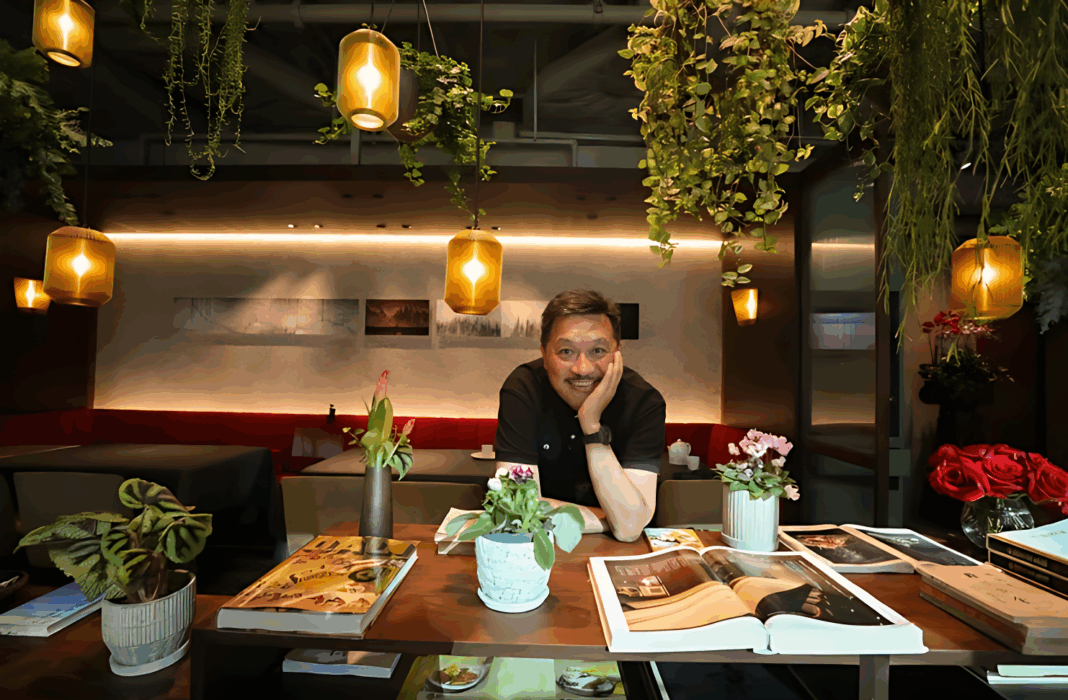How one man’s search for the perfect meal transformed Hong Kong dining ||
Danny Yip remembers the weddings most of all. Growing up in a family too poor to eat out, those rare banquet occasions were when he discovered what food could actually taste like. At home, his mother’s stomach condition meant everything was overcooked and mushy. But at those wedding tables, young Danny glimpsed something extraordinary – the potential of Chinese cuisine when done right.
“I envy chefs who say their mum was a good cook,” he told The World’s 50 Best Restaurants in conversation. “Unfortunately, I had the reverse: my mum was a terrible cook!”
Today, that same boy runs a restaurant so sought-after that even he jokes: “I cannot get a booking myself!” The Chairman has climbed to No. 26 in the World’s 50 Best Restaurants 2024, became the first Hong Kong restaurant to top Asia’s 50 Best in 2021, and holds a Michelin star. Its signature steamed flowery crab has achieved legendary status among food lovers worldwide.
But the journey from bad home cooking to culinary greatness wasn’t straightforward.
The Australian Awakening

In the 1980s, Yip left Hong Kong to study accounting in Canberra, Australia. Working part-time in Lebanese, French, Italian, and Chinese restaurants to support himself, he discovered something that would change his life: what real food could taste like.
“I had a voracious appetite for good food,” he recalls of those days when he’d start as a waiter or kitchen hand and talk his way into cooking roles. Despite missing most classes due to work, he passed his degree with flying colors. But instead of pursuing accounting, at age 22, he partnered with seven university friends to open Window on the Orient.
It was 1988, and Chinese food in Australia was, in Yip’s words, sanitized for foreign palates. The “big four” dominated menus: Mongolian lamb, lemon chicken, honey prawns, and sweet and sour pork. But the food being served was terrible, he realized. Migrant Chinese chefs were “rinsing the meat and washing off the blood, so whether you were eating beef, lamb, or chicken, they tasted the same. It was all seasoning, MSG, and color.”
Yip and his friends asked themselves: What if we create our own sauces, use fewer chemicals, avoid MSG, and make better food? The 120-seat restaurant turned tables twice at lunch and dinner. Success.
But it was trips to Melbourne’s revered Flower Drum and Sydney’s Tetsuya that truly opened his eyes to what Chinese cuisine could become. Tetsuya Wakuda’s French-Japanese fusion was “a revelation in creativity,” inspiring Yip to sell his first restaurant and open Madam Yip, then the acclaimed Chairman & Yip in 1992.
The Money Years

Running restaurants meant grueling 16-hour days, seven days a week, for slim profits. So, in 1997, Yip returned to Hong Kong with a different plan: to make real money. He launched several internet companies and achieved financial security.
“I was so busy making money, I didn’t think about cooking at all,” he told The World’s 50 Best. “Then I realized I was happy but not content.”
By the 2000s, Yip had sold part of his tech business and semi-retired. He was drawn back to Hong Kong’s wet markets, finding the experience “therapeutic.” In 2009, he opened The Chairman.
The Philosophy
Hong Kong had many good Chinese restaurants, but they all served the same dishes. Yip longed for creativity. “Creation gives you satisfaction that can’t be replicated by making money,” he explained. Food, apart from tasting good, should have an emotional connection.”
This wasn’t about abandoning tradition. It was quite the opposite. “Like painting or calligraphy, you always follow a master exactly to start, but after enough training, you’re supposed to have your style,” he said. “Too many Chinese restaurants remain beholden to the master, but you can still respect tradition and add your own thinking.”
The Chairman’s approach became clear: embrace Chinese cooking’s traditional skills and ingredients, but create original recipes. No following old formulas. No playing it safe.
The Team That Makes It Work
Central to this vision is head chef Kwok Keung Tung, who has been with the restaurant since day one. Finding the right chef wasn’t easy – Yip talked to many who had the skills but didn’t understand his vision.
“We could not have done it if we didn’t have a stable team,” Yip shared with Tatler Asia. “We’ve been researching, thinking, discussing, and brainstorming together for 14 years. About 80% of our staff, either in the kitchen or front of the house, have either been with us since day one or have been with us for 10 years. This is something I’m really proud of.”
But even Kwok needed time to embrace the freedom. “It took him more than five years to let go of his legacy training and fully embrace the freedom to create,” Yip recalls. “That is when the restaurant truly hit its stride.”
The Creative Process

Yip’s role is to gather inspiration. “In my notes, I have a huge list of ingredients – things I’ve seen, recipes, ideas, and photos. I collect all of that every day,” he told Tatler Asia. Then, they work with themes, like last year’s focus on fire.
The process is painstaking. “Out of 20 ideas and a lot of experimenting, we yield about two to three dishes for the whole year. So, if we can create four to five new dishes in a year, we’re happy.”
Take their camphor wood-smoked goose – the creation Yip is happiest with so far. It took nine months to develop and embody their less-is-more philosophy: just goose and salt, with an elaborate cooking process. The goose is marinated in poultry stock, salted, slowly steamed, left overnight, then smoked with camphorwood, and deep-fried to create an aromatic, confit-like bird.
The Ingredients Hunt
While others talk about farm-to-table, for The Chairman, it’s simply natural. “Cantonese food is about freshness and locality.” They source from their own farm in Sheung Shui, handpick seafood from Aberdeen’s markets daily, and seek out forgotten ingredients from remote villages – 20-year-pickled lemon, sugar-roasted chrysanthemum, elusive fresh mini water crabs.
Their famous steamed flowery crab uses the prized delicacy from the South China Sea, steamed with 15-year-old Chinese wine, chicken fat and clam juice, served with fragrant chicken oil and flat rice noodles. No shortcuts, no compromises.
The New Chapter

In 2022, The Chairman moved from its quiet Kau U Fong location to The Wellington Tower in Central. Yip missed the changing seasons on that tranquil street – the autumn leaves turning golden, spring buds sprouting. But the new space allowed him to create what he’d always dreamed of: a restaurant that feels like home.
“The happiest thing in life, I think, is when you can invite friends over to have a meal at home,” he told SCMP. The new space features sage green paneling, dark wood floors, cherry-red velvet banquettes, plants from his home balcony hanging overhead, and floor-to-ceiling bookshelves filled with rare cookbooks.
The menu has evolved, too. Instead of extensive à la carte, diners now receive a list of available dishes a few days before their visit and select their ideal combination. “I prefer the act of choosing. It’s like your dinner starts before your actual dinner. You get excited a few days before.”
The Mental Game
Running a restaurant in Hong Kong isn’t easy. “It’s extremely hard to survive in Hong Kong and make money by running a restaurant. I mean, the rent [here] is out of this world,” Yip shared.
Still, Yip has developed a routine that’s kept him grounded for years. “I get up at around 3:30 a.m., and I have four to five hours, which is 100% ‘me time’. I exercise, meditate, read, and think. No one will send you a WhatsApp at that time. I think ‘me time’ is very important for mental well-being. It’s like an escape for me, like rebooting the computer.”
Recognition and Rivalry

When awards started coming – first topping Asia’s 50 Best, then climbing to the global top 10 – Yip remained characteristically low-key. “We just wanted a place where we could cook and eat the food that we like to eat,” he said.
“Now, the awards confirm to us that our approach is acceptable and, in a way, quite successful. So that gives us more encouragement to push the boundaries in the future.”
On imitation, he’s philosophical. “If anyone wants to know how to steam the flowery crab with aged Shaoxing wine, just ask me, and I’ll send you the recipe. There are no trade secrets,” he told Tatler Asia. “But the direct 100% copy of a dish without inputting, I don’t think that will work… The customer is not dumb. They see it, they understand it, and then they will compare it with the original.”
The Booking Battle
Getting a table remains nearly impossible. The restaurant is simply too small for its fame. But Yip has noticed that successful bookers have strategies.
“When they get onto the website, they go straight to June and book lunch or a weekday dinner. Because if you focus on Friday, Saturday, or Sunday in April or May, everyone is thinking the same. You need to think differently.”
Looking Forward
Despite global acclaim, Yip has no plans for expansion. “We don’t want to move or open a new restaurant; we just want to create and have fun. We’re content,” he shared.
His broader vision is for Hong Kong itself. “Decades ago, Hong Kong was named a food paradise, but we don’t hear that as often as before. We’d like to work closely with other talented chefs in Hong Kong and, together, be able to present the Hong Kong food scene as a whole. Hong Kong is still a food paradise. Come to Hong Kong. Spend a whole week here!”
From a boy eating terrible food to a man creating some of the World’s best – Danny Yip’s story is one of transformation, persistence, and the simple belief that food should have an emotional connection. In a city of countless restaurants, The Chairman stands apart not because it abandoned tradition but because it dared to make tradition its own.





